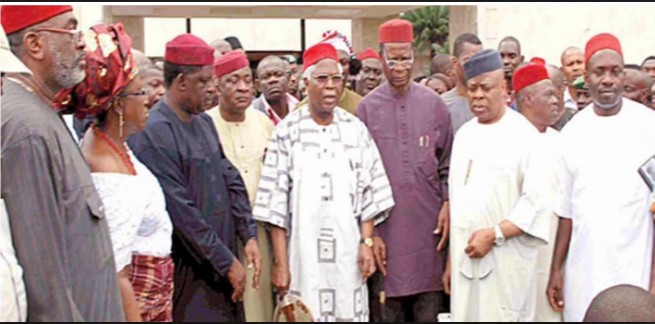
The Igbo have a clear notion of who they are. They call themselves Igbos or Ndigbo (Igbo people). But at the point of cultural contacts non-Igbo writers have wrongly misspelt them as Heckbos, Heebos, Egboes, Eboes or Ibos.
I tackle these misnomers right away.
There are 36 letters in the Igbo alphabet made up of 8 vowels (Udaume), 19 consonants (Mgbachiume) and 9 blends (Udamkpi). The third letter, “gb,” falls under Udamkpi. “Gb” is different from “g” and “b,” which are (Mgbochiume). Call us “Igbos,” not “Ibos.” The language we speak is also called Igbo.
Since creation, Igbos have lived in the Lower Niger down to the Niger Delta area of the Bight of Biafra. To their East (Eke) are the Annang/ Ibibio and Efik peoples. They are bounded in the West (Orie) by the Yoruba and Edo. In the North (Afo) by the Hausa/Fulani groups; while in the South (Nkwo) are the Ijaw/Ogoni kingdoms. Some forty million Igbos today live within and outside the Nigerian borders.
The culture of Igbo people is called Omenala Igbo. It has man and his well being at its very center. This culture envisages life to include the past, present and future. Cultural practices like prayer, farming, dancing, sacrifice, birth, marriage and death are there to ensure that one’s link with the world beyond is not broken.
The Igbo family includes the unborn, the living and the dead, for which reason abortion has no place in Igbo culture. Our family is made up of the father, mother(s) and children. It includes all those related by blood to a common ancestor. Marriage between persons even remotely related by blood is strictly forbidden. Igbo family/society is patriarchal but one completely balanced with female values. Yes, we pay ilobola to marry somebody’s daughter.
Politically, chief-priests and elders ruled Igbos for thousands of years. There was no time in Igbo history when they were ruled by one man as their core value frowns at unilateralism. Their system of government is best described as theocratic-democracy as (1) the Igbo recognize only Chukwu (God) as their spiritual and secular king and, (2) government is by mutual consent after wide and open debates usually at the market place.
Igbo Traditional Religion
I must privilege Prof. Emmanuel N Onwu’s submission that Igbo religion in its original form was a “direct revelation of ‘Chukwu,’ ‘Chineke’ to the Igbo earliest ancestors” (2002 Ahiajoku Lecture, Owerri). It pre-dates Christianity.
Secondly, it is Judaism in its unwritten form. Igbos believe in the sacredness of blood. They circumcise their male children eight days after birth, observe religious purifications and washings. Altogether, if you codify the religious practices of Igbo people what will emerge is an authentic version of the Pentateuch.
Igbos believe in a Supreme Deity called Chukwu (the Great God) who created all things. Chukwu is also called Chineke (God the creator). The Igbo religion, like Christianity, engages creation from a common source or monogenesis.
The Igbo also believe in an entity called Ekwensu (the Devil) who is the father of all evil and enemy of Chukwu.
Apart from Chukwu, the Igbo have a pantheon of other lesser gods. We therefore have a polytheistic situation where Chukwu presides over lesser deities who act as his messengers.
Man and His “Chi”: Meaning of “Chi” in Igbo Cosmology
Let me introduce this topic by stating that Igbos see things in two. Scholars of Igbo studies call this the principle of complementary dualities. Nothing is absolute and alone. Our philosophical thoughts equip us to see man and woman, life and death, water and fire, secular and spiritual and, so forth.
Igbos have a firm grasp of the abstract. It is true that Igbos talk mainly in proverbs. Now we know that proverbs and analogies are there to help you transmit complex ideas with the human language. Our ancestors did all these bestowing on us certain immutable truths we can feel and connect harmoniously with. One such truth is predestination. Another is will power. Between these polarities the concept of “chi” makes sense.
Even if man is predestined to die, the Igbo believe one can through conscious effort and good deed delay his death and even alter its circumstances. I believe that is what Professor Donatus Nwoga had in mind when he asserts that “Things not only form and act in dualities, it is also possible for forms of reality to change both within the same type of reality and from one type of reality to another. ‘No condition is permanent’ does not only operate within the social system, but also at the ontological level” (1984 Ahiajoku Lecture, Owerri).
Using the medium of the inadequate English language, my closest definition of chi is that it is one’s guardian spirit bestowed on him at birth by Chukwu (God). You excel or fail only with the consent of your chi.
An Igbo believes he can achieve the impossible as long as his chi does not accept defeat. He believes he can build rocket if he works hard and if his chi approves of his efforts (Igbos actually built functional rockets within a seven-month research and production period during the 1967-1970 Biafran/Nigerian war). Coming to South Africa with little more than a traveling bag, he believes he can make it with the blessings of his chi.
This is a paper presented by Chigachi Eke, Secretary, Research and Planning Committee of Ohaneze Ndigbo of South Africa, on African Day Celebration Organised by the Randfontein Local Municipality, Gauteng, Republic of South Africa, 23rd of May 2009.
Credit: Igbobia






